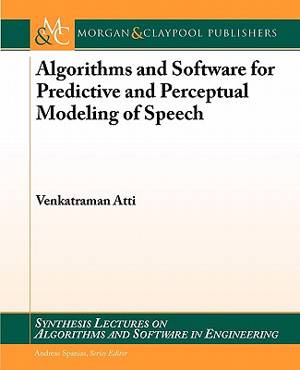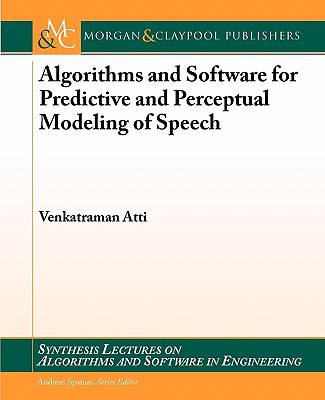
- Retrait gratuit dans votre magasin Club
- 7.000.000 titres dans notre catalogue
- Payer en toute sécurité
- Toujours un magasin près de chez vous
- Retrait gratuit dans votre magasin Club
- 7.000.0000 titres dans notre catalogue
- Payer en toute sécurité
- Toujours un magasin près de chez vous
Algorithms and Software for Predictive and Perceptual Modeling of Speech
Venkatraman Atti
57,45 €
+ 114 points
Format
Description
From the early pulse code modulation-based coders to some of the recent multi-rate wideband speech coding standards, the area of speech coding made several significant strides with an objective to attain high quality of speech at the lowest possible bit rate. This book presents some of the recent advances in linear prediction (LP)-based speech analysis that employ perceptual models for narrow- and wide-band speech coding. The LP analysis-synthesis framework has been successful for speech coding because it fits well the source-system paradigm for speech synthesis. Limitations associated with the conventional LP have been studied extensively, and several extensions to LP-based analysis-synthesis have been proposed, e.g., the discrete all-pole modeling, the perceptual LP, the warped LP, the LP with modified filter structures, the IIR-based pure LP, all-pole modeling using the weighted-sum of LSP polynomials, the LP for low frequency emphasis, and the cascade-form LP. These extensions can be classified as algorithms that either attempt to improve the LP spectral envelope fitting performance or embed perceptual models in the LP. The first half of the book reviews some of the recent developments in predictive modeling of speech with the help of Matlab(TM) Simulation examples. Advantages of integrating perceptual models in low bit rate speech coding depend on the accuracy of these models to mimic the human performance and, more importantly, on the achievable "coding gains" and "computational overhead" associated with these physiological models. Methods that exploit the masking properties of the human ear in speech coding standards, even today, are largely based on concepts introduced by Schroeder and Atal in 1979. For example, a simple approach employed in speech coding standards is to use a perceptual weighting filter to shape the quantization noise according to the masking properties of the human ear. The second half of the book reviews some of the recent developments in perceptual modeling of speech (e.g., masking threshold, psychoacoustic models, auditory excitation pattern, and loudness) with the help of Matlab(TM) simulations. Supplementary material including Matlab(TM) programs and simulation examples presented in this book can also be accessed here. Table of Contents: Introduction / Predictive Modeling of Speech / Perceptual Modeling of Speech
Spécifications
Parties prenantes
- Auteur(s) :
- Editeur:
Contenu
- Nombre de pages :
- 113
- Langue:
- Anglais
- Collection :
Caractéristiques
- EAN:
- 9781608453870
- Date de parution :
- 01-11-10
- Format:
- Livre broché
- Format numérique:
- Trade paperback (VS)
- Dimensions :
- 190 mm x 235 mm
- Poids :
- 226 g

Les avis
Nous publions uniquement les avis qui respectent les conditions requises. Consultez nos conditions pour les avis.






